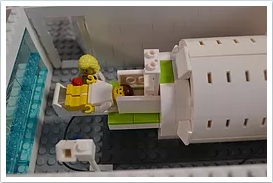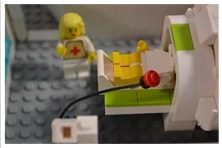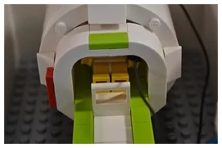Parent-Teen Study fMRI Session
For the Parent-Teen Study, in addition to your initial appointments, your adolescent has the opportunity to participate in an fMRI scan session. It’s completely non-invasive (no medications or injections or anything like that), all the teen has to do is lay down in a fMRI scanner, (just from their shoulders up) play a computer game (where they can earn money) and then look at different kinds of pictures.
In total the child is in the scanner for 60 minutes and will receive $100 (plus whatever they receive for completion of the computer game).

What is an fMRI?
An fMRI is a large tunnel, like a long donut, which is actually a camera with a tunnel going through the middle that takes pictures of the inside of your body.
Why it’s important to have one? How do I do it?

Our research is interested in looking at your brain!
To understand your brain better, we will take some pictures of it through this scan! You don’t need to smile during this fMRI scan, but you have to listen to instructions and try to stay really still. The camera will come close to you but won’t touch you.
What happens when I have an fMRI?
Here’s a great video about this on youtube:
https://www.youtube.com/watch?v=IMpfW8KtoE8

But Basically this is what happens:
You will be lying on a bed which slides through into the big tunnel. The fMRI camera makes loud noises when it takes pictures, like very loud hums, knocks, beeps, and clicks.
Samples of the noises can be found here:
https://www.youtube.com/watch?v=xS_V_OgeX-U
The fMRI technologist will provide ear plugs or headphones that can help decrease the noise. The fMRI technologist taking the pictures will be able to see you and talk to you during the procedure.
Other things about having an fMRI
- Sometimes a parent can stay with you during the fMRI.
- If you get cold, we provide a blanket for you during the fMRI.
- The fMRI technologist and a graduate researcher will be with you during your scan and give you instructions about each task.
- Try your best at the pictures and video task we provide during the scan and the scan will be over before you know it!
Take a look at what our facility looks like!
Frequently Asked Questions:
* Are MRI scans stressful for children and teens?
Most children and teens experience little to no stress in the MRI environment. In fact, many children and teens find it rewarding to participate in neuroscience research about the developing brain. If your teen is feeling nervous about the scan we offer a chance to go into the “mock” scanner to get a feel for what the session will be like.
Your child or teen can decide to stop the study anytime they wish, without penalty. We make sure they understand this when they provide informed consent to their participation.
*Is it safe to have an MRI?
There are no known or foreseeable risks or side effects associated with MRI scanning procedures except for those people who have electrically, magnetically or mechanically activated implants, or metal in or on their bodies. Therefore, we carefully remove all metal from participants before they are approved to enter the MRI environment. We will provide more detailed information about MRI scanning if you and your child or teen come in to participate.
* Can my child participate if they have braces?
If your child has any metal on or in their bodies that cannot be removed (nonremovable piercings, certain orthodontic work, pacemakers, clips) we might not be able to enroll them in our MRI studies. We can assess this in greater detail over the phone. However, we do have another study that does not involve an MRI session for the child. Please refer to the Parenting Mindfully Study page for more information.
Photo sources: https://www.amazings.eu/kids https://medicalxpress.com/news/2017-12-fda-issues-tougher-mri-dye.html Siemens Prisma high performance 3 Tesla (3T) whole body Magnetic Resonance Imaging (MRI) scanner in the Peterson Family Health Sciences Hall. Photo by Evan Cantwell/Creative Services/George Mason University




